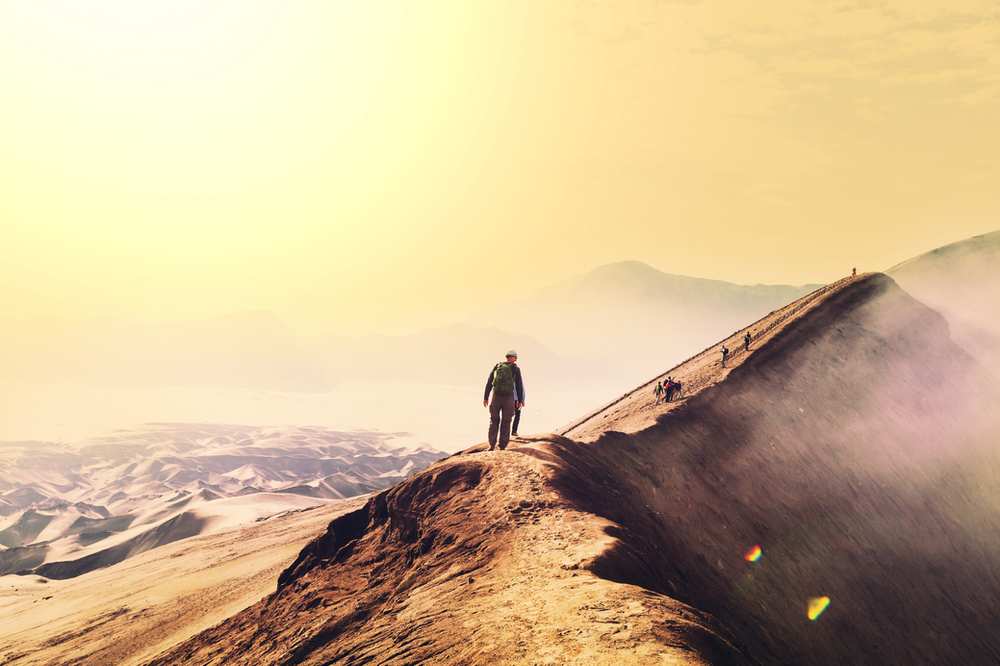
Montessori describes the history of the earth in mythic and poetic language, attributing intent and heroism to the small contributions of microorganisms, tracing the influence of water, imperceptible in the moment but massive over time, detailing the balanced negotiations of air to sustain life. And most of the time, she presents these stories like a gentle dance, each element rising and receding as it is needed, without conflict or distress.
But sometimes, every so often, she describes these processes as rage, as fiery emotion, that literally tears open the earth in “titanic conflict” to rebuild it again. She gives mother earth an anger and a destructiveness, reminding us that it’s not all singalongs and kumbaya.
Thank goodness.
When Montessori describes the evolution of the earth, she presents the story as an allegory to our own growth, as societies but also as individuals, as parents and teachers and adults who want to transform ourselves.
There is often peacefulness, that gentle dance, without conflict or distress.
But sometimes there is anger. Sometimes there is titanic conflict.
Sometimes the demands are too great, and our patience too slim. We lose our tempers. We are ready to be done already. We are frustrated. We feel thwarted. The children don’t seem to be listening. The calm of the environment that so inspired us when we learned about Montessori seems like some impossibility. There’s chaos, or conflict. Combustibility. There is anger.
Oh, and just like the emotions Montessori ascribes to the earth, there is unsettling. What little predictability we had is jostled by our anger, like the anger of the earth overturns the land. We are our own volcanos.
Not all the time. But sometimes, and sometimes can sometimes do more than we feel we have done the rest of the time. Because we care so deeply for the children, and because we want so badly to do this work well, we beat ourselves up when we let ourselves down. We want to be these perfect saints that Montessori tells us we can be, gentle and contemplative and unshakable. But sometimes there is anger. Sometimes there is titanic conflict. And when there is, it is like we’ve torn ourselves up too.
Remember: when Montessori describes the evolution of the earth, she presents the story as an allegory to our own growth, as societies but also as individuals, as parents and teachers and adults who want to transform ourselves. There will sometimes be anger. We’re not going to get it right all the time. This is exceptionally hard work. Invaluable, essential, irreplaceable, inspiring, rewarding, and exceptionally hard. To pretend that we are never frustrated by the pace, or by the conflict between what we want and what the children want, or by the other demands that are placed on us outside of those relationships, would be to pretend that we are something we’re not, to self-limit the range of our emotional lives. We would suffocate in our own inauthenticity. We would model an antiseptic and unsustainable perfection for the children.
And antiseptic is the right word here: meaning opposing decay, but also “scrupulously clean,” and “extremely neat” and “coldly impersonal” and “a substance that inhibits growth.” Because, just like the analogy of the earth, even when we tear ourselves open, it is because we are becoming something new. If we don’t acknowledge the parts of this work that cause us to lose our temper, we won’t know where we need to grow. We won’t know where we need to compensate for our own erosion.
This is not to say that we should seek out anger, but that, when it happens, as it will inevitably happen, we need to respond as the story tells us, to make great efforts to evolve better legs, to transform the face of the earth by what we leave behind. We need to acknowledge what evoked the anger, how we want to change and what we want to leave to decay. And then, we need to get back to work. Forgiving ourselves, we can offer grace to the children when they misstep. Learning from our own mistakes, we can prepare environments within which we know the children will. Moving on from it, we can honor the evolution in ourselves and in the communities to which we contribute. Still, in her more peaceful mood, the work goes on.
*a response to "To Educate the Human Potential," Chapter 7: A Primeval World-War, M. Montessori
